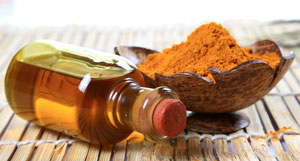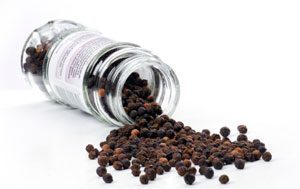Clinical Trials Show Need to Increase Turmeric Bioavailability in Alzheimer's Patients


There are many lab and animal studies suggesting that turmeric and/or curcumin could prove to be extremely valuable in terms of prevention and treatment of Alzheimer's disease. Unfortunately there are very few human studies. Still, some clinical trials are currently underway. They involve patients with mild cognitive impairment and probable Alzheimer's disease. (iv.95)
Two completed studies that were conducted produced little information regarding the effectiveness of treating people who already had some degree of the disease: (iv.95)
In one randomized 6-month clinical trial involving 32 patients with moderate Alzheimer's disease, patients were divided into 3 groups. Doses of 1 or 4 grams of curcumin a day were given to 2 treatment groups. The third group was given a placebo. All patients involved in the trial were also allowed to continue standard drug treatment and/or vitamin E supplementation. In addition, they were all given 120 mg/day of standardized Ginkgo biloba. (iv.96)
Patients were given cognitive tests at the beginning and end of the study. No measurable difference in cognitive ability was found in either dosage group when final test scores were compared to baseline cognitive test scores. At the same time, there was also no difference seen when compared to test score differences in the placebo group. There were no negative side effects reported. (iv.96)
Could this mean curcumin had no effect greater than placebo is slowing cognitive decline? The researchers who conducted the study noted that this lack of effect could have been due to no loss of thinking skill and/or memory in the patients given a placebo. They suggested lack of cognitive decline was possibly because of the concurrent drug and herbal/vitamin treatment. In other words, it was difficult to measure curcumin's true effect on the rate of cognitive decline without comparing it against a completely untreated group of Alzheimer's patients. (iv.96)
In another 24-week randomized, placebo-controlled clinical trial with patients suffering from mild to moderate Alzheimer's disease, patients were also divided into 3 groups. Two treatment groups were given 2 or 4 g/day of curcumin, and the third group was given a placebo. (iv.93, 97)
Researchers found no positive differences in cognitive measures between those treated with curcumin and the placebo group. Although the full details of the experiment were not published, it does not appear that other treatment drugs were involved. The unpublished results from this study and another clinical trial have led some experts to suggest that treating patients who already have Alzheimer's disease with unenhanced curcumin may not be useful. It could be that the neuron brain cell damage is too advanced for curcumin to effectively treat without enhancing its bioavailability. (iv.93, 97)
In both studies, there were trends noticed in the amount of toxic plaque and fibril forming proteins in the bloodstream. However, the results were conflicting. The study involving curcumin and ginkgo (along with conventional drugs and vitamin E in some patients) showed a trend towards slightly lowered levels of amyloid-beta proteins. The second study showed a slight increase in these protein levels. (iv.93, 96)
Ways to Increase Bioavailability
The researchers who conducted the studies discussed above are working on increasing curcumin's bioavailability. Two ideas in the works are: (iv.77, 97)
- Creating more absorbable forms of curcumin.
- Combine curcumin with an omega-3 polyunsaturated fatty acid derived from fish oil.
Combining curcumin with fatty acids has its roots in cultural diets. Comparing Alzheimer's disease rates between India and the United States certainly provides some anecdotal encouragement that combining curcumin with oil to increase bioavailability may work. Population-based studies show that people in India, who regularly consume turmeric cooked with oil as part of Indian cuisine, have far lower rates of Alzheimer's disease than in the United States. (iv.77, 97)
Could the Turmeric Compound Curcumin Improve Pharmaceutical Applications?
A recently published animal study on PLGA-encapsulated curcumin certainly seems to suggest so. Considered a safe, extensively tested substance, PLGA is frequently used by the pharmaceutical industry to encapsulate active ingredients in medicines. It's considered to be a safe, biodegradable, and injectable encapsulating substance. (iv.99)
Nevertheless, PLGA often causes substantial inflammation at the injection site. This side effect was virtually eliminated by the curcumin it encapsulated. (iv.99)
Throw in Some Alpha Lipoic Acid
According to recent investigations, adding alpha lipoic acid to the fish oil and curcumin combination can also help increase bioavailability in both the blood and the brain. Dissolving curcumin in fats such as phosphatidyl choline, olive oil, or stearic acid also seems to work. (iv.45, 97)
Spice up Your Diet with Black Pepper
Already completed clinical studies in humans indicate that combining 20 mg of piperine with 2 grams of curcumin increases its bioavailability 20-fold. Combining it with oil fats may improve this even further. Along those lines, in animal studies lipidated forms of curcumin (combined with fats) were tested. Results showed that curcumin levels reached four times the level of regular doses of curcumin powder or curcumin and piperine in the brain. (iv.45, 97)
Injectable Curcumin
Animal studies in breast cancer strongly suggest that using injectable, sustained-release forms of curcumin may be one of the best ways to overcome bioavailability issues for treatment purposes. Only one dose of the curcumin microparticles injected just under the skin resulted in sustained curcumin levels on the blood for a full month. (iv.98-99)
The dose contained approximately 58.2 mg of curcumin encapsulated in Poly Lactic-co-Glycolic Acid (PLGA), which is an FDA-approved biodegradable polymer. PLGA allows a controlled release of the treatment substance it's combined with. Interestingly, tissue levels of curcumin were much higher in the brain than in the blood in these studies. This suggests it may be a particularly useful form of curcumin in the treatment of Alzheimer's and other brain conditions. (iv.98-99)
Join the 1000s of People Who Are Discovering the Benefits of Turmeric.

Healthceuticals® Turmeric Curcumin Complex
100% Certified
Organic ingredients
- Organic Turmeric Extract - standardized to 95% curcuminoids.
- Organic Whole Turmeric - provides full spectrum antioxidant, anti-inflammatory turmeric benefits, including turmerones and numerous vitamins, minerals, and phytonutrients
- Organic Black Pepper Extract - standardized to 95% piperine; dramatically enhances bioavailablity.
- Organic Phospholipids - markedly improve absorption.
- Organic Ginger - works synergistically with turmeric to provide more powerful benefits.
- Absolutely FREE of potentially harmful additives and fillers such as magnesium stearate.



